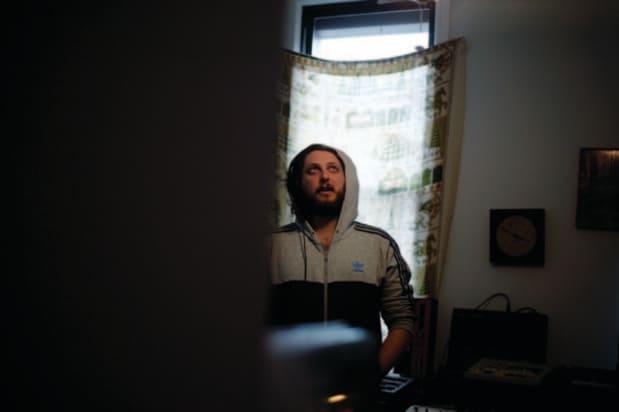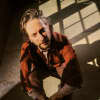Daniel Lopatin's recently released album, Replica, recorded under his stage name Oneohtrix Point Never, touches on many of the canonized tropes of contemporary classical music, while simultaneously pushing away from a circumscribed route, adding punchy ideas and a lot of crude percussion and samples. The songs are short, though, often feeling as much like kernels as complete thoughts. Is that the point? Much of Lopatin's previously releases music has been about long journeys that he now thinks did not go anywhere. Replica covers greater distances in a lot less time, seemingly as much a product of restlessness as efficiency. Replica is exciting to listen to for many reasons, primarily viscerally, but also as a conceptual nerd: it feels like progress. But is it a new direction for the experimental world or the pop one? Is there a difference? As he continues to record, at bare minimum, Oneohtrix Point Never will be the forum for the plethora of stuff churning in Lopatin's brain, while at best it will change what we consider new music to be. We spoke with him over the phone last week. He had a cold.
Why are Replica's songs so short? The type of music you are making has a lineage of coming from composers making longer “pieces,” not songs. So are these songs just the genesis for longer ideas? I wanted it to feel like a song, a cycle of songs, but, um, that idea came not initially but when I started sort of categorizing these different sounds/tones that I was sampling. I found myself using conventional pop or rock metaphors to organize sounds, and I was like, Well, here’s a rhythm section or something that I can characterize as such or is symbolic of that, and here’s a lead guitar type thing or here’s the vocals or whatever. Although it’s not really one to one relationship, I wanted those things to be the innuendo of songs, to be like the innuendo of band responsibilities to be within the way that I construct these songs. The short format is just appealing to me because I guess I didn’t want to make another record that was an extremely dense, long form, sort of expansive thing that grows in time. I wanted [the songs] to be really streamlined and fit and spacious in a way that was like listening to club music or pop jams on the radio in taxi cabs like in New York or on tour or whatever. Just like being exposed to music for the first time cause I was traveling so much. I was hearing like a lot of contemporary music that I’m not usually privy to, just cause my lifestyle is such that I don’t like really check stuff out like that. I’ll get kind of into like a cocoon of old music a lot of the time. But then I check out contemporary music and I’m like, Wow it’s so interesting how The-Dream’s track operates. There’s really three to four fundamental, core sonic things that are happening at any moment. Or like a Dr. Luke jam or even like somebody like James Blake who I kind of have mixed opinions about musically, but I think is really brilliant in his the way he structures music and the decisions he makes and how he uses silence. So yeah, that’s basically it.
James Blake is a guy who is playing all the music he heard growing up at once, classical piano music and British dance music. For you, that context seems like it maybe ran from Morton Feldman to Silver Apples. But listening to Replica, I hear DJ Nate, too, music that might not typically be a part of an experimental composer’s background. I like definitely like grime, different versions of British dance music and footwork stuff, Chicago stuff. All of it is fundamentally to me the big break from the past, how the producer can pretty much be anybody and there’s a Spartan approach to things where it’s like you just have very few elements that carry the whole thing and bass becomes really important and basic core elements of sound become important and like one sample that captures an emotion becomes really important. It’s very dramatic. It’s dramatic music. Something I got discouraged about was like, here I am making this music, and I’ve been refining it for awhile, but a lot of the other music that I listen to all the time, that I listen to as a fan, is not really making its way into my music and I was questioning whether or not that was because I was being shy or was I just not like being courageous enough to just go for it or what was it exactly?
I love the other records I’ve made and I feel like they haven’t gone anywhere. There’s a place for my old sound that‘s in the new record too, but I had refined it to the degree that Returnal is just like, just a better version of the record prior to it. At that point, you're just like, Well, I'm making these statutes to an idea of something, I'm memorializing this thing, this starting point, but I'm not really moving forward. I also wanted to shed a lot of the baggage of having been pigeonholed with other artists that were reportedly into certain things or ideas, certain zeitgeist-y ideas, hypnagogic pop type of ideas. There's good stuff there, but what was always fun for me was deconstructing it and playing the role of the joker and being like, Here's what you think you understand, or here's this style of music or reality that is supposed to manipulate you this way, but I'm going to manipulate it and make you feel this way. I just wanted to get away from all that and then it was, the joke is on me. Everybody knows what I do.
I feel like that stasis you’re describing from your old records is gone on the new one. Listening to Replica, I’m overwhelmed with the diversity of sounds, often existing at the same time, and then excited when I wanted to go back and parse them. But all the ideas are so short, they often feel like a tease. Yeah. You want to come back when it's so overt and stretched out, ad infinitum. That's kind of the problem with long form records that are jammy or whatever, you get this vibe and you just exploit it over the course of 40 to 60 minutes. It's kind of cheap. I started feeling kind of cheap in a way, because that's not an enlightened use of repetition at all. We can talk about kosmische music, Klaus Schulze and Tangerine Dream or whatever… They were not using repetition in an enlightened way. Their music is very primitive in a lot of ways. Some of it's amazing and inspiring and interesting and whatever, but that format to me was very cheap.
But part of that is a nod to the technology needed to make that music at that point. It's much simpler to make complicated music now. Yeah, and I was reading something recently, like an old review of some dance record on Pitchfork, and then it said that Kid606 had said that making incredibly sophisticated music had become so simple that anybody could do it. So then, how can you move forward with the idea of a composer. One person was saying, That's fucking great, it's so democratized or whatever. But I'm competitive with myself and competitive with other musicians and producers just to remain stimulated, not in any kind of aggressive way, but I don't think the role of the composer needs to be democratized per se. I want to hear you personality in your music. You can say whatever you want about James Blake, like the music or not, but I listen to that music and I really get a sense of him and I think that's what people should strive for. There's a place for anonymity, too, but I didn't want to just continue down this road of making music that played itself, you know?
Were you bored? Yeah.
Because the shift from your older music to this, it certainly sounds like the same artist, but very far away. I can imagine you writing song ideas on the back of napkins, like someone might write ideas for a sitcom plots. Did you have a zillion ideas? For me it's very visual and a semiotics workout. To put out the overt version, like “Child Soldier,” you're like, Okay, well, I want to hear all these kids voices juxtaposed with these laser beam sounds and these explicitly Middle Eastern distorted voices. You start creating an geographic, semiotic thing. You're just like, What do all these sounds mean together? What are they saying? What’s happening? So, it's super fun, it’s super stimulating for me. More so than just constructing a painting or a sculpture the way that I do in other kind of forms with piano. I'm not bored with the long form format, I'm just bored with, Okay, you set a bunch of things into motion and then you just abandon them. Brian Eno already did that. That's what discreet music is. That's what tape music is. It's beautiful. It's amazing that exists. There's a place for that. But that's not for my gen— That’s not for me to repeat.
Sounded like you were going to say “generation?” Does it become a question of who else is in that generation, a question of audience? Are institutions like Lincoln Center where you’d eventually like to see Oneohtrix be, more traditional venues? Is that something you want or even think is possible? That's something that might be the worst idea ever. There's so much that needs to happen before that makes sense. There's such an ocean of knowledge that I'm missing, in terms of how to get from where I am to how to interact with other musicians or a space like that or a tradition. I wouldn't be so aloof as to assume that I can just jump into that and it make sense. I can perform the way I perform anywhere, but would that really be interesting? It would be cool to find a way to describe this music in a way that communicates with other musicians, but it would be a huge undertaking, probably. I wouldn't shy or waver necessarily, but there's a certain respect that goes into something like that where you really have to put in the legwork to understand what you're doing and the why and how.
But I think your music is a lineage to people like Philip Glass, people part of those canonical institutions that are now dying for a younger generation to participate. Just a quick anecdote: I was asked by the office of Beck Hansen to do a remix for Phillip Glass' 75th birthday remix record. And I did it. And it got rejected. That's basically where we're at. They'll ask me, but I won't get in. So I'm on the outskirts. And that's fine, to be honest. But I thought I’d done a really good remix. I was pretty stoked, I thought that I'd done something worthwhile and they were flat out like, “No, this is not good enough.” I’m interested to see what makes it onto that. Probably stuff that's more palatable.



